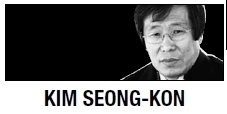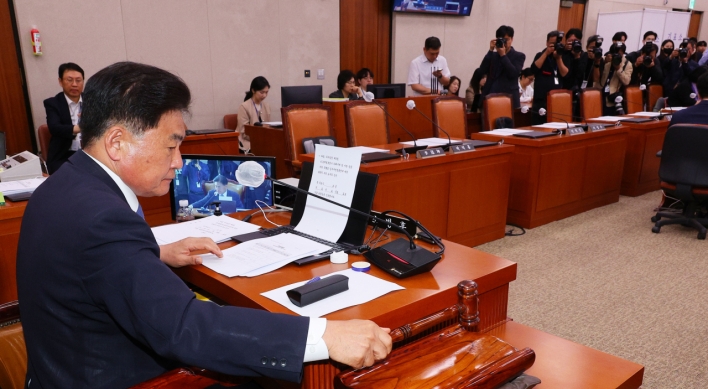[Kim Seong-kon] Remembering Edward Said’s call for reconciliation
By KH디지털2Published : Sept. 1, 2015 - 17:57
When September comes around every year, I remember my mentor, Edward W. Said, who sadly passed away in September 2003. More than 10 years have passed since he left this world, but Said’s influence can still be felt all over the world. When Abraham Lincoln was assassinated in 1865, Walt Whitman lamented his abrupt death, exclaiming, “O Captain! My Captain!” So did scholars of postcolonialism and cultural imperialism when Said died of leukemia when he was at his best. He was only 67.

A few days ago, I was invited to give a talk on Said as part of the prestigious Naver Open Lectures Series. In front of an enthusiastic audience and eminent scholars such as Kim U-chang and Yu Jong-ho, I shared my reminiscences of professor Said, who was my academic adviser at Columbia University 33 years ago and which linger in my mind even today.
“I like New York City,” Said used to tell me. “It’s a city of exiles. Even though you live in New York City, you can never belong here.” Indeed, newspapers published in New York City called him “a self-appointed exile in New York from Palestine.” “Had Erich Auerbach not exiled in Istanbul,” Said often reminded me, “he would not have been able to write his masterpiece Mimesis.” While in spiritual exile in the States, Said, too, wrote monumental books such as “Orientalism,” and “Culture and Imperialism.” He called his works “books of exile.”
Despite being an exile on foreign soil, Said seldom grieved or harbored grudges. Instead, in his seminal book, “Culture and Imperialism,” he wrote, “Yet when I say exile, I do not mean something sad or deprived. On the contrary belonging, as it were, to both sides of the imperial divide enables you to understand them more easily.” Reading this passage, one cannot but help admire Said for his extraordinary open-mindedness and magnanimity.
Until his death, Said had been known as a powerful critic of Western imperialism. At the same time, however, he had the generosity of acknowledging the positive side effects of imperialism. He said, “One of imperialism’s achievements was to bring the world closer together.” As seen in this statement, Said’s greatness lies in his capacity of embracing even his political foes.
This flexibility eventually made him “a border intellectual” who belonged to two worlds. For example, Said was an Arab, and yet he was a Christian. Likewise, he belonged to both the East and the West. He was born in Jerusalem and educated in British and American schools. He spoke both Arabic and English fluently. Even his name bears both a Western name, Edward, and an Eastern name, Said. Thus I mischievously called him, “East West Said,” instead of Edward W. Said. Besides, his best friend was Daniel Barenboim, a famous Israeli musician, and when he needed chemotherapy, Said chose Mount Sinai Hospital, a Jewish hospital in Manhattan.
In addition, Said condemned not only Western imperialism, but also Third World ultranationalism. After sharply criticizing Western colonialism, he wrote, “This by no means exempts the aggrieved colonized peoples from criticism; as any survey of postcolonial states will reveal, the fortunes and misfortunes of nationalism, of what can be called separatism and nativism, do not always make up a flattering story.” Said warned that history showed us that a likely alternative to Western imperialism would be Third World dictators such as Idi Amin and Saddam Hussein, who used ultranationalism for political gain. That was why he lamented, “Western imperialism and Third World nationalism feed off each other.”
Said argued that due to Western imperialism, we now have overlapping territories, intertwined histories and consolidating visions. As a result, he contended that there was no such thing as “pure culture.” He said, “Partly because of empire, all cultures are involved in one another; none is single and pure, all are hybrid, heterogeneous, extraordinarily differentiated and unmonolithic.”
Remembering Edward Said in Seoul, I came to realize that we, too, should be generous enough to forgive and reconcile with our political foes. Like Said, we should have the capacity to embrace hybrid, heterogeneous culture and become true “border intellectuals” who belong to more than one world. Instead of parochial jingoists, we should become global citizens who can live peacefully with other cultures and other people. Above all, we should now forget our age-old grudges and move on to the future.
When Said gave a talk at Seoul National University in 1995, someone in the audience asked, “Why do you advocate reconciliation between East and West? Shouldn’t we fight against the West?”
“I don’t have a homeland to go back to. But you do,” answered Said with a pathos. “Why, then, can’t you forget the grudges of the past while I can?” Listening to the man who was deprived of his homeland, the audience blushed with shame.
Until his death, Said strove for peace between East and West so hard, but to no avail. May he rest in peace.
By Kim Seong-kon
Kim Seong-kon is a professor emeritus of English at Seoul National University and the president of the Literature Translation Institute of Korea. -- Ed.











![[Kim Seong-kon] Democracy and the future of South Korea](http://res.heraldm.com/phpwas/restmb_idxmake.php?idx=644&simg=/content/image/2024/04/16/20240416050802_0.jpg&u=)





![[KH Explains] Hyundai's full hybrid edge to pay off in slow EV transition](http://res.heraldm.com/phpwas/restmb_idxmake.php?idx=652&simg=/content/image/2024/04/18/20240418050645_0.jpg&u=20240418155304)

![[Today’s K-pop] Zico drops snippet of collaboration with Jennie](http://res.heraldm.com/phpwas/restmb_idxmake.php?idx=642&simg=/content/image/2024/04/18/20240418050702_0.jpg&u=)